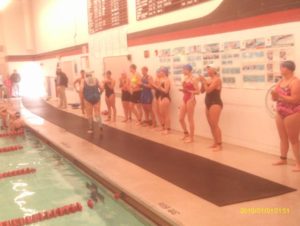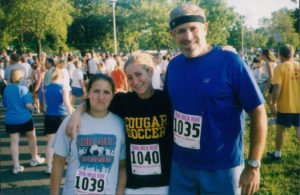Enhance your Fitness Journey with a Support Team
By Lindsay Nauen, MBA, Health & Wellness Coach
During my fitness journey, one lesson I learned was the importance of support, both formal and informal. When you pay professionals for their expertise, that’s formal support. Informal support comes from the people in your life who are there for you. They may be friends, family, neighbors or colleagues.
Formal Support Team
As you begin a fitness journey, it is essential to have professionals who will support you. Where you start depends on your needs. For some people, it is their primary care physician who has identified a health problem such as weight gain or being pre-diabetic.
Many people begin with a fitness trainer. For others, it might be starting with a therapist because they need help with an issue.
A health and wellness coach can help you identify your strengths and values to create a wellness vision. Some of the other professionals you could use are a dietician or nutritionist, a massage therapist, and medical specialists for specific health issues.
As you develop your professional support team, here are some factors to consider.
Primary care physician
Quite likely, this is your best place to start. Your doctor can determine if there are any constraints on the exercises you can do. Also, your primary care physician can give you referrals to a dietician or nutritionist.
A personal trainer
I would recommend that you ask these questions of a personal trainer:
A. What are his/her educational background and certifications?
The first thing to look for is that they have an undergraduate or graduate degree in a related field, such as exercise science or kinesiology. It is essential that a trainer be certified by a national organization, such as the American College of Sports Medicine (ACSM). This ensures that he or she has the education and has been trained and tested to work safely and effectively with people like you. Other nationally recognized bodies are the American Council on Exercise (ACE), the International Sports Sciences Association (ISSA), the National Academy of Sports Medicine (NASM) and National Strength and Conditioning Association (NSCA).
B. What are the trainer’s experiences with your population? As an example, on my journey, I needed someone who had the education and experience to train obese, post-menopausal women.
It may cost more and take more time to find the right trainer, but it will be an essential component to learning safe, effective routines. It is also important that your primary physician has approved you for exercises. If a trainer doesn’t require this, find a new trainer. Your health and safety should be a priority.
Help with nutrition
There are two types of professionals who can help with nutrition concerns: a dietician and a nutritionist. A dietitian is an expert in dietetics, a branch of knowledge concerned with diet and its effects on health. A dietitian will commonly alter a client’s nutrition based on a medical condition and/or individual goals. A registered dietitian must have at least a bachelor’s degree with approved coursework and 1200 hours of supervised experience. They must also have passed a national exam.
A nutritionist is a term used for anyone who offers general nutritional advice. They deal with general nutritional goals and behaviors. Many have advanced degrees and have passed national boards to become certified nutrition specialists. Taking the exam requires a master’s degree in an appropriate field and 1000 hours of practical experience.
Dietitians and nutritionists can both help you lose weight and change the content of your diet. What is most important is finding the credentials and level of training of the person with whom you are working.
As with a personal trainer, you need someone who has experience working with people who have had similar needs. For a person who needs help developing a healthy diet, a dietician may be a just fine. On the other hand, if you have a medical condition such as diabetes or food allergies and intolerances, a nutritionist may better meet your needs.
Informal Support Team
Your informal support team includes the people in your life who will help you. They might be members of your family, neighbors, friends, business colleagues, co-workers and trusted members of your groups and organizations. As you progress, these people will notice the changes. As you hit barriers, these are people to turn to for help.
Some members of my informal support team have been my fellow triathletes and race participants. I learned this during my first race when one of the runners came back to run with me to the finish line. Another example was when the fellow swimmers cheered me on as I finished the indoor swim in Alexandria.
Fellow triathletes in Alexandria
Triathletes in general are supportive of each other. Even the elite athletes will acknowledge your efforts with a High Five or a “Good going!”
My family has always been an important part of my informal support team. This has included my siblings. My mother has always been interested in hearing about my races and is so proud of me. Although she can no longer attend my events in person, she is eager to hear about them.
My brother and nieces at my first 5 K 2006
Of particular help is Richard Weil, my husband of 44 years. In the first few years of my fitness journey, he came to every event to cheer me on. Later, he started joining in on events because, as he said, he got tired of waiting around for me to finish. He found out that he is a runner and finished half marathons in the 2-hour, 30-minute range.
Some members of your support team may need to be educated. Perhaps you mother can be asked to have fresh fruit as well as pie at Thanksgiving. Perhaps you will need to ask your family to stop bringing sweets into the house or to keep them away from you. When my husband buys the Halloween candy, I ask him to put it away and out of my sight. I don’t want to be tempted.
If you are not getting the support you need from family, then it might be time to get help from a counselor and add that person to your formal support team.
As you think about your fitness goals, you’ll find that it’s a much brighter path when you have appropriate support and positive people helping you along the way. Be healthy. Be happy.
Biography
Lindsay Nauen is a graduate of the Mayo Clinic Wellness Coach Training Program. She has been on a fitness journey for the last 14 years, during which she lost over 170 pounds. No Quick Fixes: A Fitness Journey for the Real World is the book she wrote about her experiences and the lessons she learned. For more information about Health and Wellness coaching, contact her at noquickfixes18@gmail.com.


